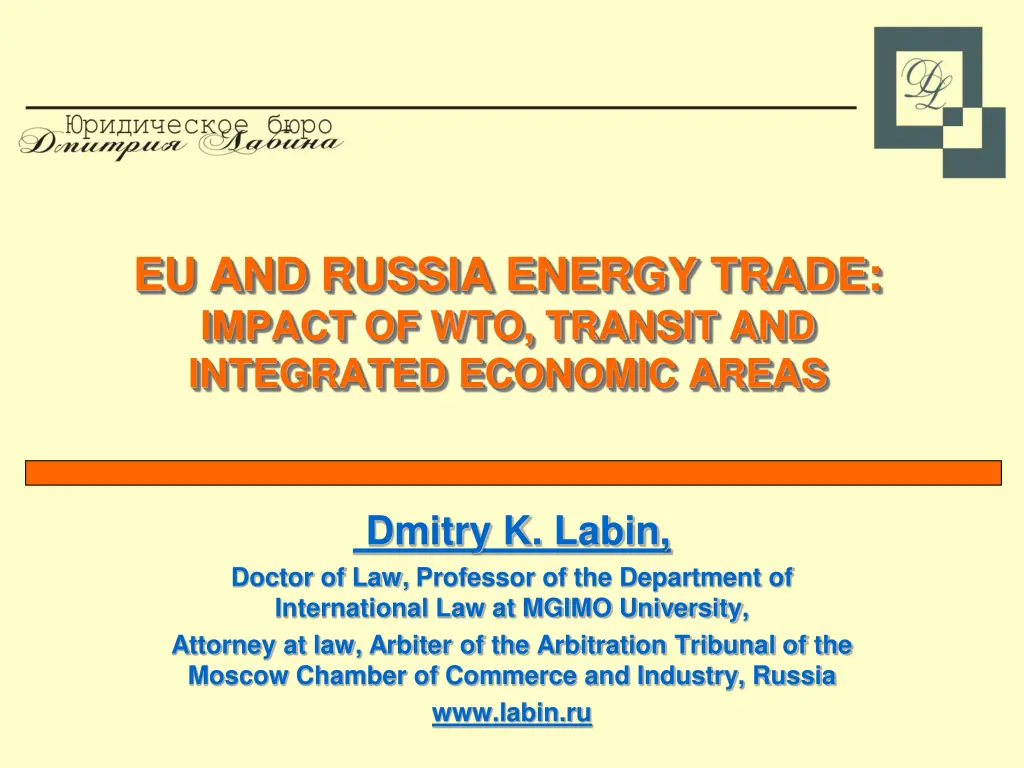
Impact of WTO on Energy Trade Between EU and Russia
Exploring the impact of WTO accession on Russia's energy trade with the EU, focusing on legal aspects, natural resource regulations, and practical implications. The article delves into the legal nature of energy resources and the sovereign rights of states over them, within the framework of WTO principles and international law.
Download Presentation

Please find below an Image/Link to download the presentation.
The content on the website is provided AS IS for your information and personal use only. It may not be sold, licensed, or shared on other websites without obtaining consent from the author. If you encounter any issues during the download, it is possible that the publisher has removed the file from their server.
You are allowed to download the files provided on this website for personal or commercial use, subject to the condition that they are used lawfully. All files are the property of their respective owners.
The content on the website is provided AS IS for your information and personal use only. It may not be sold, licensed, or shared on other websites without obtaining consent from the author.
E N D
Presentation Transcript
EU AND RUSSIA ENERGY TRADE: IMPACT OF WTO, TRANSIT AND INTEGRATED ECONOMIC AREAS Dmitry K. Labin, Doctor of Law, Professor of the Department of International Law at MGIMO University, Attorney at law, Arbiter of the Arbitration Tribunal of the Moscow Chamber of Commerce and Industry, Russia www.labin.ru
Issues Introduction: Russia accession to WTO WTO law and International Law Legal nature of natural resources Regulation of trade in energy products under the WTO rules Some practical issues
Marrakesh Agreement Establishing the World Trade Organization singed on the 14th of April 1994 entry into force since the 1st of January 1995 157 Member States Russia accessed on the 22nd of August 2012 Click here to return to homepage
WTO main principles trade without discrimination further liberalization of tradethrough the multilateral trade negotiations predictable market access, including rules on mutual obligations of States and transparency fair competition in international trade encouragement for institutional development and economic reforms with the special and differential treatment for developing countries,
Sources of WTO law Marrakesh Agreement Establishing the WTO numerous other agreements and understandings included in the annexes to this basic agreement other relevant international conventions customary international law general principles of law and both judicial decisions and teachings of the most highly qualified publicists as subsidiary means
Legal nature of energy resources Statuses of natural resources undiscovered resources in the subsoil explored, but not extracted resources extracted resources
Sovereign rights of a State over natural resources Resolution adopted by the General Assembly 3281 (XXIX). Charter of Economic Rights and Duties of States ARTICLE 2.1 ARTICLE 2 Every state has and shall freely exercise full permanent sovereignty, including possession, use and disposal, over all its wealth, natural resources and economic activities. The Organization is based on the principle of the sovereign equality of all its Members.
Regulation of trade in energy products under the WTO rules GATT Agreement Article Ion the general most-favored nation regime. Article Von the freedom of transit Article VIon the application of anti-dumping and countervailing duties in the case of subsidies Article XIon the prohibition of quantitative restrictions on the import / export
Practical issues The problem of coordination in setting global oil prices WTO, Russia and the integration areas. The issue of export duties Russia and the EU - energy sector perspectives
Conclusions and recommendations to set the same fair rules for the exporting and importing energy products countries and make sure that they are applied coherently on a constant universal basis and are not invoked only when it is to the benefits of one actor and ignored otherwise
